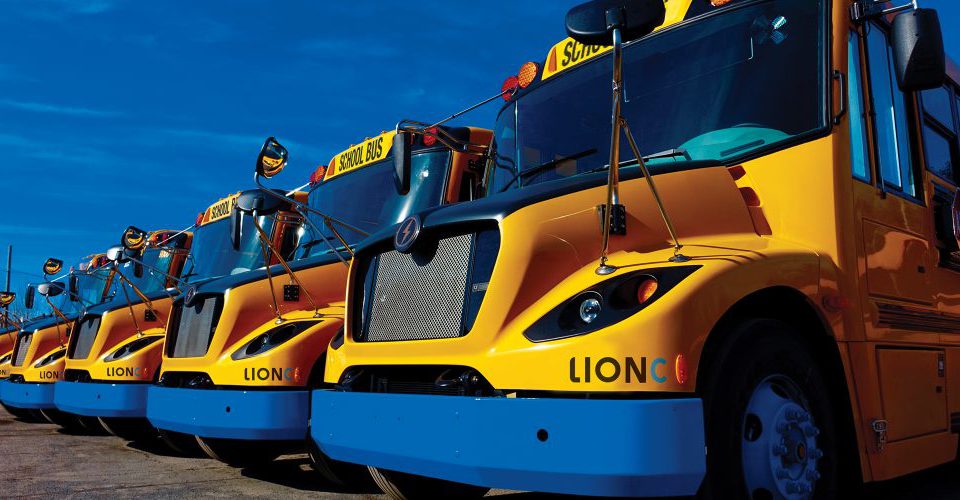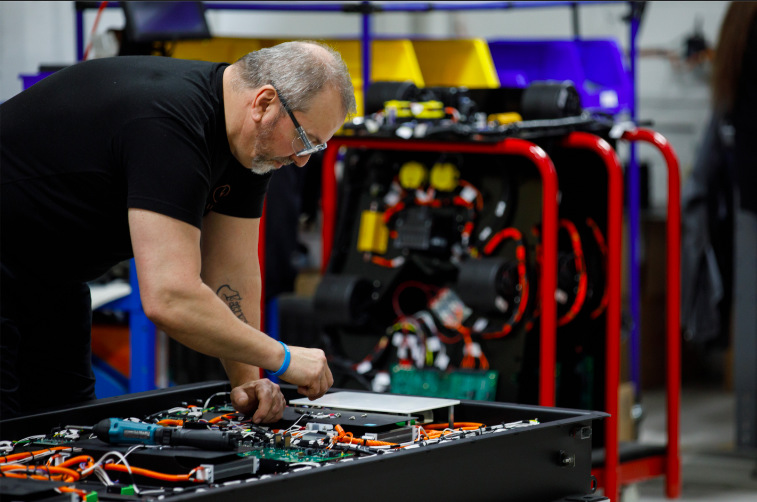Yellow is the new green. School bus fleets are ready for electrification in North America. An interview with Lion Electric’s CEO Marc Bédard
Canadian company Lion Electric has in the electric school bus segment its core business. «We expect over 100,000 school e-buses to be launched in the next decade», says Marc Bédard, the company’s CEO. A new facility is set to allow an increase of production volumes by 20,000 yearly.
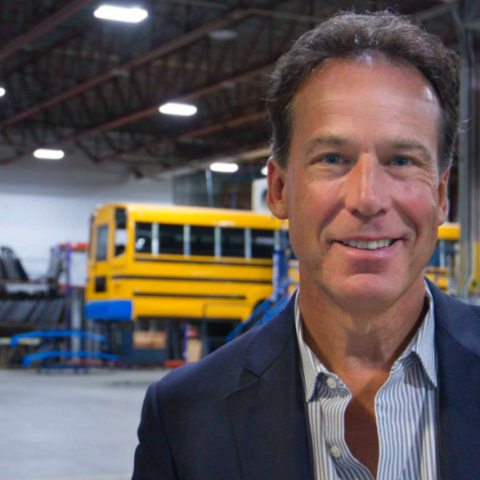
This interview has been previously published on
Sustainable Bus magazine #3, issued in April 2021
Canadian company Lion Electric has in the electric school bus segment its core business. «We expect over 100,000 school e-buses to be launched in the next decade», says Marc Bédard, the company’s CEO. A new facility is set to allow an increase of production volumes by 20,000 yearly.
Marc Bédard: saving money with electric buses
Marc Bédard, may you quantify the repercussions of the Covid crisis on Lion Electric sales volumes in the bus field? Which is the forecast for this year?
«Speaking in terms of the school bus market, 2020 was a tough year for district budgets and there are still a lot of questions left to be answered in terms of the future. However, school districts still have a schedule to keep in phasing out older buses, which actually can work to the advantage for adoption of electric vehicle buses. With budgets being squeezed, one of the side effects is that districts are taking a closer look at electric buses partially due to the associated cost savings. Districts operating electric buses have been saving thousands per bus in energy and maintenance costs, and we have customers operating electric fleets at scale who are realizing these savings now, and others are noticing. Available incentives in certain markets can also reduce costs drastically. With budgets constrained, saving on bus operations is more critical than ever and 60% reduced maintenance cost and 80% reduced energy cost is enticing. For 2021, we already have multiple truck and bus deliveries planned, and that isn’t taking into account any pending incentives or plans to electrify the U.S. school bus fleet».
Electric will always be less expensive compared to combustion when taking into account total cost of ownership – even without incentives. But the higher cost of acquisition can be a roadblock for electrification, so incentives are there to accelerate the transition – we won’t need incentives forever, we believe in 5 to 6 years electric vehicles will be much less expensive and much closer to price parity with combustion.
Marc Bédard, Lion Electric CEO
Which is your production capacity today and which capacity are you targeting?
«Today we have over 300 electric school buses on the road in North America – these are real deliveries in service, and not orders and deliveries combined – which have driven over 10 million km. In our current facility located in Saint-Jérôme, Quebec, we can build up to 2,500 vehicles per year. We also plan to open a U.S. facility in the next two years, and that will significantly expand our production capacity by an additional 20,000 units per year, and also allow us have production closer to our customers and expanding network of Experience Centers in the U.S».
Potrebbe interessarti
Lion Electric to open a US manufacturing plant in Illinois. Capacity for 20K ZEV
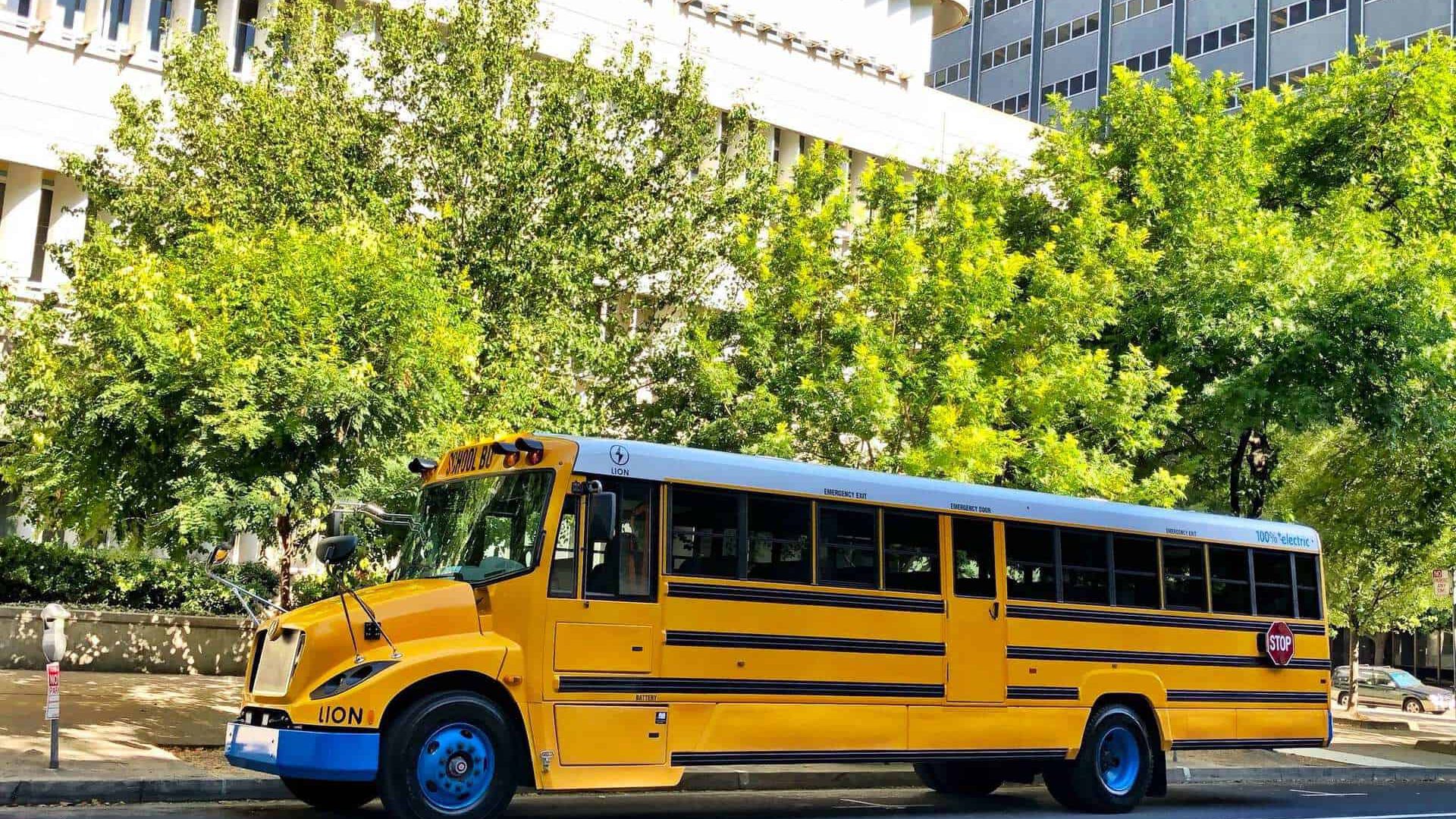
In an interview we had with Dan Raudebaugh, CTE’s Executive Director, he told us: «Diesel school buses are only about 25% of the cost of a forty-foot diesel transit bus, so the incremental costs of the zero-emission propulsion systems is harder to swallow. Add to that the fact that there is no government agency to assist with the costs of school buses, like FTA does for transit buses. What we need for this market to get rolling is a national recognition of the importance of transitioning the school bus market to zero emissions. We need both public and private money brought to the table to help». Which is your position on this?
«Electric will always be less expensive compared to combustion when taking into account total cost of ownership – even without incentives. But the higher cost of acquisition can be a roadblock for electrification, so incentives are there to accelerate the transition – we won’t need incentives forever, we believe in 5 to 6 years electric vehicles will be much less expensive and much closer to price parity with combustion. In the U.S. and Canada, there are actually significant incentives in place for the adoption of electric school buses. These vary from state to state, and even by smaller regions like counties or cities, or even certain utilities, but the savings are very significant. In fact, we have an entire team in place – the LionGrant team – to assist our customers in securing funding. This is very important as available funding can be the deciding factor for some districts to go electric. In some cases they are getting an electric school bus for far less than a diesel equivalent. But the application process can be very challenging for districts who may have limited resources and actually can serve as a detractor, so we help them through the process to realize the benefits of electrification. For an incentive example, in California, the Hybrid and Zero-Emission Truck and Bus Voucher Incentive Project (HVIP) covers a large percentage of the incremental cost of an EV over diesel. Programs like this take the cost down drastically and can be the impetus to push operators into converting to electric. Policies like HVIP are very important early on in the electrification process and those who are early adopters stand to benefit the most. This is just one example – there are many programs in place in North America incentivizing school bus electrification, some specific to school bus like the California Energy Commission school bus replacement program. With the Biden administration’s American Jobs Plan, it is also likely more incentives will be announced at a Federal level in the US soon».
Lion Electric: energy utilities and bus electrification
Which will be the role of the energy utilities in the process of bus (and school bus) electrification?
«Electrification of transportation offers a huge opportunity for utilities in terms of demand. You would have to look back to the mass adoption of air conditioning for a similar jump in grid demand. What is important for utilities is to promote electrification, rather than make it difficult – which can actually serve as a barrier to adoption. This can be done in a variety of ways, from favorable rates and lower/minimal demand charges, to incentives for vehicle and charging station purchase. To electrify bus operations at scale, it is important for utilities to work closely and cooperatively with operators on scaling their service for appropriate and economical charging. We have found this to be so important that we built an entire team – LionEnergy – to handle the infrastructure process so that it is seamless for our customers».
The election of the new Biden-Harris administration may be a gamechanger for the EV industry. Especially concerning electric school buses, as Biden’s Build Back Better plan proposes making all American-made buses zero-emission by 2030, starting with the school bus fleet. Which are your expectations in this regard? Is the industry ready to keep up with such a challenge? And the operators, are they ready? The change to e-vehicles requires new skills…
«Yes, we absolutely feel that this goal can be met. It should be noted that the recently unveiled American Jobs Plan, unveiled on March 31, is now targeting 20% of the US school bus fleet through a Clean Buses for Kids Program managed by the EPA. This is a great start, but we think the entire fleet can be replaced. For operators, the most important thing is getting infrastructure and training in place. We help them do all of this through our LionEnergy charging infrastructure team and BrightSquad».
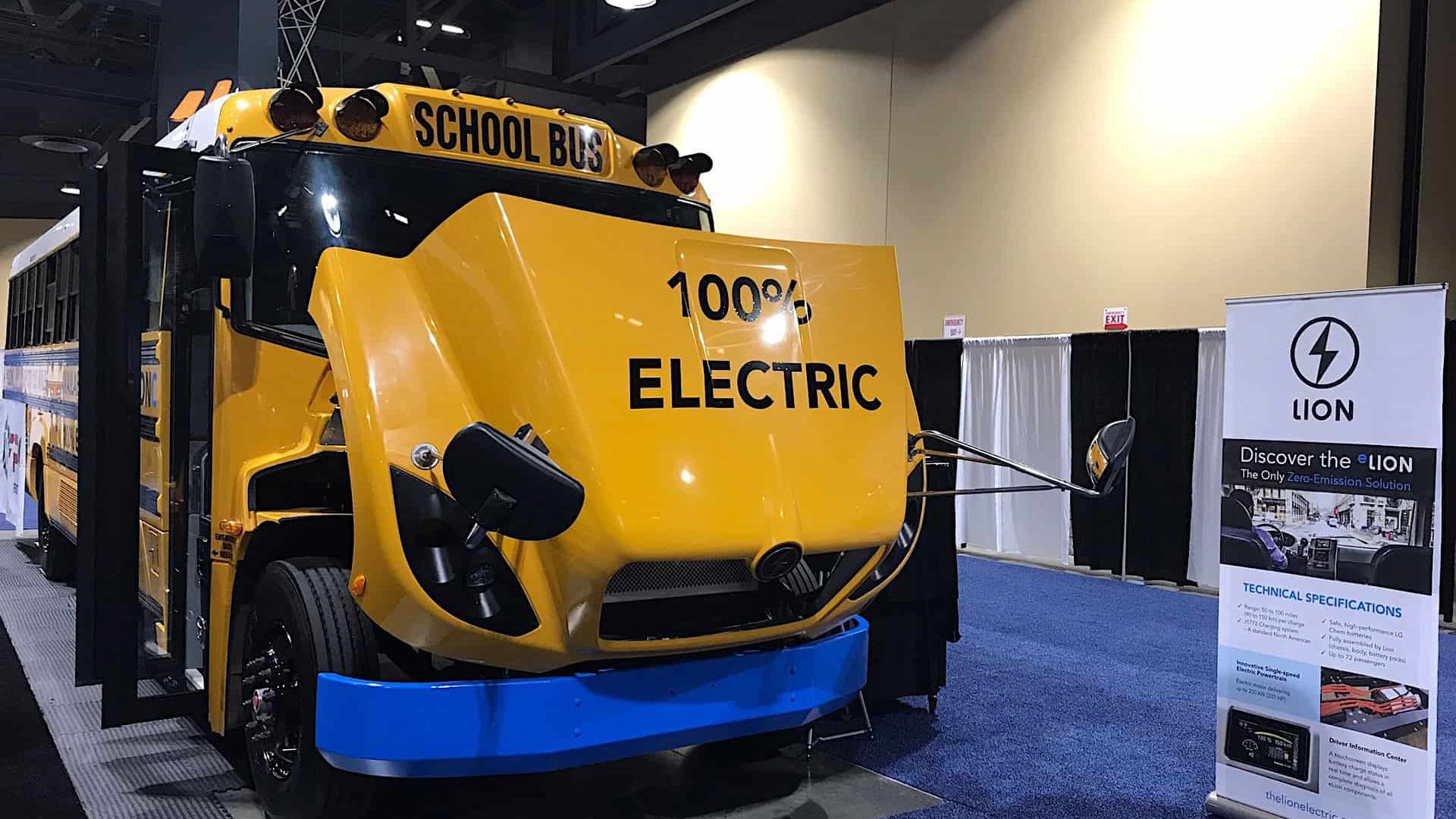
According to consulting firm Interact Analysis, «over 560,000 school buses are currently projected to be built in the next 10 years, of which slightly less than 27,000 will be electrified». Do you agree with such a forecast?
«The numbers need to be updated in light of the unveiling of the Clean Buses for Kids Program’s 20% fleet replacement goal. Just by factoring that in, this number should be near 100,000 electric buses. However, we feel that it will be higher. There is a lot of momentum behind electric and the total cost of ownership savings can allow school districts to put money back into classrooms that would otherwise be used on bus operations. The feedback that we get from school districts upon moving to electric is overwhelmingly positive and many are reluctant to go back to diesel».
Electric school buses in North America, a bright future
Most of Lion Electric activities are related to the electric school bus field. Which other vehicles are offered in your portfolio and which results are you targeting with such products?
«Lion creates, designs, and manufactures all-electric class 5 to class 8 commercial urban trucks and all-electric buses and minibuses for the school, paratransit, and mass transit markets. Lion is a North American leader in electric transportation. We have an incredible line up of 7 vehicles available now and that will quickly increase 15 different vehicles in the next two years. Our trucks are built for a variety of functions in various segments, including box trucks (freight and delivery), refuse, bucket trucks (utility) and semi-tractor trailer».
Which are, today, the main challenges in North America related to e-bus adoption?
«Education in electrification is still the most important thing in order for adoption to increase. Once you get someone to drive and EV, most are sold on the concept and all of the anxieties go away – instead, they flip their thinking and start to look for solutions. At Lion, we build education into everything we do, and it’s a big benefit for us to have a dedicated sales team who can work directly with customers to understand the benefits of electrification. The cost can also be off-putting, though the aforementioned incentives largely negate this. It’s important to remember that year-over-year, battery cost is going down while range is going up – along with adoption. The day when EVs reach price parity with gas/diesel is not far off, at which point EVs become drastically more affordable to operate.
You recently announced the construction of a battery factory in Quebec, with a «capacity of 5 gigawatt-hours in battery storage, enough to electrify approximately 14,000 medium and heavy-duty vehicles annually». Is Lion Electric in the future going to provide battery modules to third party players?
«The batteries produced in our plant will be developed specifically to power vehicles manufactured by Lion. We will be producing modules and packs specific to our vehicles, and controlling our own production will reduce costs significantly. It will not be possible in the short or medium term to equip our batteries on vehicles manufactured by other manufacturers. In the longer term, however, there is the possibility that Lion will produce batteries for manufacturers not in direct competition with Lion.
For now, we are focused on our current business. Producing batteries in Quebec and Canada will have a secondary effect of inspiring innovation in the sector and companies in electrification across North America will benefit from this momentum».
Potrebbe interessarti
Lion Electric selected Mirabel as location for battery manufacturing in Quebec (Canada)
Electrification is bringing serious changes in companies’ strategies. Lion Electric announced it is going to be publicly listed, as another big player headquartered in California and a UK-based startup which is heavily betting on this sector. Do you think that a new season has begun in the transport sector? Are we about to witness upheavals in terms of industrial balances?
«We are absolutely in the midst of a paradigm shift in transportation – many will tell you this shift is coming, but it is here now. It is clear that there is opportunity for disruption from newcomers, Tesla has absolutely proven that not only can it be done, but that electric can be cool and there is plenty of consumer appetite for EVs. Again, when you factor in the lower total cost of ownership, decreasing battery costs and increasing range, electric transportation becomes inevitable when it is that much more reliable and affordable in comparison to gas/diesel. The established OEMs are very aware of this, and it’s encouraging to see an increasing number dedicating their product lines and brands to zero-emission in the future. We believe the momentum will continue to swing in this direction».

